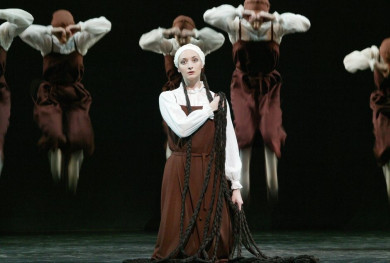Main Stage
| 13 February |
| 19:00 |
| 2022 | Sunday |
|
Stars of the Stars Evening of one-act ballets: Les Noces. Symphony in Three Movements Ballet
|
|
| Artists |
Credits |
Soprano Mezzo soprano Tenor Bass Dancer Piano Zarina Shimanskaya Eduard Kiprsky Ballet company
|
"Les Noces"PerformersSergei Redkin (piano)
Zarina Shimanskaya (piano)
Eduard Kiprsky (piano)
Alexander Maslov (piano) CreditsScene plan, music and text by Igor Stravinsky (1923)
Choreography by Bronislava Nijinska (1923) Décor and Costumes: Natalia Goncharova (1923)
Musical Director: Valery Gergiev
Staged: Howard Sayette
Décor reproduced: Boris Kaminsky
Costumes reproduced: Tatiana Noginova
Lighting: Vladimir Lukin ABOUT THE PRODUCTION For over ten years Stravinsky was consumed with the idea of Les Noces, a choral work as "a sequence of typical wedding episodes, a reproduction from fragments typical of this ceremony of conversations." The composer sought out the musical form, the orchestral ensemble and the traditional folkloric text, which would represent a genuine Russian rite, and not describe a wedding plot in an à la rus stylisation.
Stravinsky's proposed "idea of ritual and impersonal action" found its dazzling embodiment in the choreography of Bronislava Nijinska. It was to her, a classical dancer who had once been a worthy partner and co-conspirator of her brother Vaslav, and who in the post-revolutionary years had dedicated herself to seeking out a new movement, that Diaghilev entrusted the staging of this work that was so precious to him. And, as usual, he had not miscalculated. The Paris premiere of Les Noces in 1923 emerged as a forum, and it revealed to the world a choreographer for whom this production alone would have been enough to ensure entry to the pantheon of great 20th century choreographers.
Responding to the nuances of the capricious rhythms and metrics of the music, in Les Noces the movement spoke and lived, needing no pantomime, stage props and realistic costumes. A dance of the ensemble. In the choreographer's mind, each dancer was to blend with the whole through the movement. The Bride and the Groom are mere parts of the combined ensemble, which conveyed the dramatic character of fate and the perpetuity of the protagonists in an old-style peasant wedding: just like in the maiden's braids, which before the wedding are unplaited into two parts and redressed in a woman's hairstyle, the maidens leaned their heads on each other's shoulders, bowing in ritual lamentation, leaned their heads as on an executioner's block. The extreme minimalism in subordination to the dance in the rather cool geometry of the choreographic drawing, in the insistent repetition of the monotonous movements, in the simplicity of the bicoloured brown and white costumes conceived by Natalia Goncharova and in the intentional impassivity of the performers – everything in the ballet was of its time in the context of the avant-garde of the 1920s. And in the sharp, contemporary nature of the ballet the primordial Russian nature of Les Noces was not lost – not cheaply popular and souvenir-like, but conditionally ritualistic, where the plot unfolds as if in a clockwork mechanism: the figures of the dancers intermingle monotonously, literally submitting to the will of one master, the ancient and immutable ritual.
Olga Makarova World premiere: 13 June 1923, Les Ballets Russes de Serge de Diaghilev, Théâtre de la Gaîté-Lyrique, Paris
Premiere at the Mariinsky Theatre:9 June 2003
Running time 20 minutes Age category 12+ "Symphony in Three Movements"PerformersCreditsMusic by Igor Stravinsky
Choreography by Radu Poklitaru
Set and Costume Designer: Anna Matison
Lighting Designer: Alexander Sivaev
Video Graphics Designer: Alexander Kravchenko
Assistant Choreographer: Sergei Kon ABOUT THE PRODUCTIONUsing a symphony in ballet is a 20th-century innovation. The impulse for the worldwide dissemination of the genre of the dance symphony came with a production by Fyodor Lopukhov in Petrograd in 1923 with a ballet set to the music of Beethoven’s Fourth Symphony. George Balanchine, who took part in that avant-garde production, took up the idea of the plastique interpretation of the complex musical format, developing his artistic credo as a choreographer thus: “You see the music and you hear the dance.” Inspired by the nature of pure dance he rejected any plot and superfluous psychology, behind his movements, there were no human passions, there was just the music, its rhythm and structure defining the development of the choreographic image. Following the same lines, in 1972 Balanchine created his first dance version of the score of Stravinsky’s Symphony in Three Movements. And yet there was another path in the emergence of symphonic dance. In the 1930s the choreographer Léonide Massine brought to life a whole series of symphonic ballets in which, avoiding fairy-tale narrative in a sequence of allegories and metaphors he narrated dance stories. The path chosen by Radu Poklitaru for his production of Symphony in Three Movements at the Mariinsky Theatre is close to Massine’s. In his production, one can see a plot with a beginning, peripeteia and dénouement. The images conceived by the choreographer blend together with Stravinsky’s idea: the composer admitted that the third movement of his Symphony was a response to documental chronologies of the war years with lines of marching soldiers, and later with Poklitaru, it would seem, the troops come on-stage in the finale, without succumbing to the aggression of the first two movements...
Olga Makarova Premiere: 30 December 2015, Mariinsky Theatre Age category 12+
|
|
 Mariinsky Theatre:
Mariinsky Theatre:  Mariinsky-2 (New Theatre):
Mariinsky-2 (New Theatre):  Mariinsky Concert Hall:
Mariinsky Concert Hall: 

